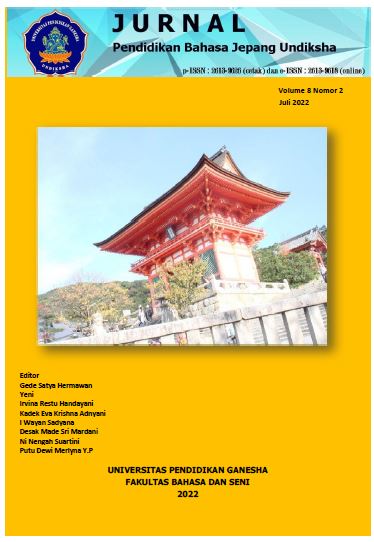Analisis Strategi Belajar Kosakata Bahasa Jepang pada Siswa SMA
DOI:
https://doi.org/10.23887/jpbj.v8i2.43714Abstract
This research aims to analyze the types of Japanese vocabulary learning strategies that are most often used by high school students. The analysis of the use of Japanese vocabulary learning strategies is studied using the theory of language learning strategies from Rebecca L. Oxford. The methods used in this research are qualitative and quantitative methods. Qualitative methods are used to describe and analyze Japanese vocabulary learning strategies for high school students. The quantitative method is used to present data on the frequency of types of Japanese vocabulary learning strategies for high school students. The data sources in this study are batch 2020 of 11th-grade students BSBU SMA Negeri 6 Malang, while the data is obtained from the results of questionnaires filled out by students. The results of the analysis show that the Affective strategy is the type of strategy most often used by students to learn Japanese vocabulary with a percentage of 69.1%. Then the Cognitive strategy is the second most frequently used strategy by students with a percentage of 66.7%. The third strategy most often used by students is the Social strategy with a percentage of 63.6%. Then the Memory strategy is the fourth strategy, and the Metacognitive strategy is the fifth. While the compensation strategy is the strategy that is rarely used by students in learning Japanese vocabulary with a percentage of 47%.
References
Alifah, F. N. (2019). Pengembangan Strategi Pembelajaran Afektif. Tadrib, 68-86.
Danasasmita, W. (2009). Pendidikan Bahasa Jepang di Indonesia Sebuah Refleksi. Repositori UPI. Universitas Pendidikan Indonesia.
Devianty, R. (2017). Bahasa Sebagai Cermin Kebudayaan. Jurnal Tarbiyah, 228-230.
Fitri, A. (2018). Strategi Belajar Bahasa Anak. PENTAS: Jurnal Ilmiah Pendidikan Bahasa dan Sastra Indonesia, 22-32.
Hidayat, A., & Ariani, D. (2021). Penggunaan Strategi Belajar Bahasa Inggris oleh Pelajar Berprestasi. Jurnal Pendidikan Vokasi Raflesia, 8-13.
Kusumaningsih, C., JH, B., & Anita, F. (2020). Strategi Belajar Mahasiswa Terhadap Pengembangan Keterampilan Berbicara. Jurnal Pendidikan Bahasa, 266-275.
Ling, Z. (2015). Research on English Learning Strategies Between English Major and Non-English Major Students. US- China Foreign Language, 706-709.
Oxford, R. L. (1990). Language Learning Strategies: What Every Teacher Should Know. Massachusetts: Heinle & Henle Publishers.
Oxford, R. L. (1996). Language Learning Strategies Around the World Cross-Cultural Perspectives. Honolulu: University of Hawai'i Press.
Purwiyuanti, R. (2014). Strategi Pembelajaran Bahasa Jepang Oleh Guru Di Sma Negeri 11 Semarang. (Doctoral dissertation, Universitas Negeri Semarang).
Rohayati, D. (2016). Analisis Strategi Pembelajaran Bahasa Dalam Pembelajaran Bahasa Inggris Sebagai Bahasa Asing (Sebuah Studi Kasus Deskriptif Di Program Studi Agribisnis). Mimbar Agribisnis. Jurnal Pemikiran Masyarakat Ilmiah Berwawasan Agribisnis, 1(3), 269-280.
Russell, A. (2010). Assessment of Strategy Inventory of Language Learning (SILL) in Students Learning a Second Language.
Saragih, S. L., & Kumara, A. (2009). Penggunaan Strategi Belajar Bahasa Inggris Ditinjau dari Motivasi Intrinsik dan Gaya Belajar. Psikobuana, 110-127.
Setiawan, M. A. (2017). Belajar dan Pembelajaran. Uwais Inspirasi Indonesia. 1-3.
Setyanto, A. Cara Efektif Dalam Pemerolehan Dan Penguasaan Goi Dalam Mata Kuliah Kaiwa.
Sugiyono, B. (2004). Strategi Belajar Bahasa Inggris Sebagai Bahasa Asing Kaitannya Dengan Faktor-Faktor Demografik Pada Pembelajar Dewasa. Jurnal Diksi, 72-90.
Sukmawati, A. K. (2020). Pembelajaran Kosakata Bahasa Inggris Menggunakan Modelling The Way Pada Kelas Iv Mi Ma'arif Polorejo Kabupaten Ponorogo. (Doctoral dissertation, IAIN Ponorogo).
Suwartika, Y. (2019). Strategi Belajar Siswa Sma Lulus Japanese Language Proficiency Test (Jlpt) N3. Hikari, 3(2).
Ulmaiah, L. A., Danasasmita, W., & Sugihartono. (2017). Kemampuan Menulis Bahasa Jepang Menggunakan Foto Melalui Media Sosial Facebook (Studi kasus terhadap siswa kelas XI SMAN 14 Bandung). EDUJAPAN, 29-34.
Vindayani, F. (2019). Strategi Belajar Bahasa Arab Mahasiswa Menurut Model Oxford. Prosiding Konferensi Nasional Bahasa Arab, 5(5), 50-55.
Downloads
Published
Issue
Section
License
Copyright (c) 2022 Jurnal Pendidikan Bahasa Jepang Undiksha

This work is licensed under a Creative Commons Attribution-ShareAlike 4.0 International License.



